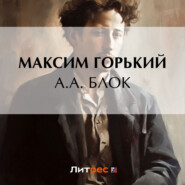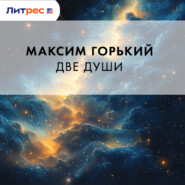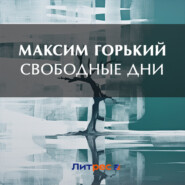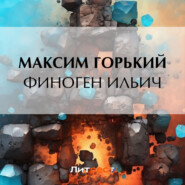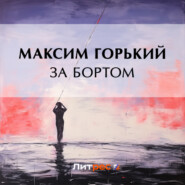По всем вопросам обращайтесь на: info@litportal.ru
(©) 2003-2025.
✖
Through Russia
Настройки чтения
Размер шрифта
Высота строк
Поля
Presently I followed the pair into the forecourt, and near the entrance-gates heard a voice say quietly:
"Do not disturb yourself, good father."
"Nevertheless" (the second voice was that of the porter of the monastery, Father Seraphim, a strapping Vetlugan) "a spectre walks here nightly."
"Never mind if it does. As regards myself, no spectre would touch me."
Here I moved in the direction of the gates.
"Who comes there?" Seraphim inquired as he thrust a hairy and uncouth, but infinitely kindly, face close to mine. "Oh, it is the young fellow from Nizhni Novgorod! You are wasting your time, my good sir, for the women have all gone to bed."
With which he laughed and chuckled like a bear.
Beyond the wall of the forecourt the stillness of the autumn night was the languid inertia of a world exhausted by summer, and the withered grass and other objects of the season were exhaling a sweet and bracing odour, and the trees looking like fragments of cloud where motionless they hung in the moist, sultry air. Also, in the darkness the half-slumbering sea could be heard soughing as it crept towards the shore while over the sky lay a canopy of mist, save at the point where the moon's opal-like blur could be descried over the spot where that blur's counterfeit image glittered and rocked on the surface of the dark waters.
Under the trees there was set a bench whereon I could discern there to be resting a human figure. Approaching the figure, I seated myself beside it.
"Whence, comrade?" was my inquiry.
"From Voronezh. And you?"
A Russian is never adverse to talking about himself. It would seem as though he is never sure of his personality, as though he is ever yearning to have that personality confirmed from some source other than, extraneous to, his own ego. The reason for this must be that we Russians live diffused over a land of such vastness that, the more we grasp the immensity of the same, the smaller do we come to appear in our own eyes; wherefore, traversing, as we do, roads of a length of a thousand versts, and constantly losing our way, we come to let slip no opportunity of restating ourselves, and setting forth all that we have seen and thought and done.
Hence, too, must it be that in conversations one seems to hear less of the note of "I am I" than of the note of "Am I really and truly myself?"
"What may be your name?" next I inquired of the figure on the bench.
"A name of absolute simplicity – the name of Alexei Kalinin."
"You are a namesake of mine, then."
"Indeed? Is that so?"
With which, tapping me on the knee, the figure added:
"Come, then, namesake. 'I have mortar, and you have water, so together let us paint the town.'"
Murmuring amid the silence could be heard small, light waves that were no more than ripples. Behind us the busy clamour of the monastery had died down, and even Kalinin's cheery voice seemed subdued by the influence of the night – it seemed to have in it less of the note of self-confidence.
"My mother was a wet-nurse," he went on to volunteer, "and I her only child. When I was twelve years of age I was, owing to my height, converted into a footman. It happened thus. One day, on General Stepan (my mother's then employer) happening to catch sight of me, he exclaimed: 'Evgenia, go and tell Fedor' (the ex-soldier who was then serving the General as footman) 'that he is to teach your son to wait at table! The boy is at least tall enough for the work.' And for nine years I served the General in this capacity. And then, and then – oh, THEN I was seized with an illness… Next, I obtained a post under a merchant who was then mayor of our town, and stayed with him twenty-one months. And next I obtained a situation in an hotel at Kharkov, and held it for a year. And after that I kept changing my places, for, steady and sober though I was, I was beginning to lack taste for my profession, and to develop a spirit of the kind which deemed all work to be beneath me, and considered that I had been created to serve only myself, not others."
Along the high road to Sukhum which lay behind us there were proceeding some invisible travellers whose scraping of feet as they walked proclaimed the fact that they were not over-used to journeying on foot. Just as the party drew level with us, a musical voice hummed out softly the line "Alone will I set forth upon the road," with the word "alone" plaintively stressed. Next, a resonant bass voice said with a sort of indolent incisiveness:
"Aphon or aphonia means loss of speech to the extent of, to the extent of – oh, to WHAT extent, most learned Vera Vasilievna?"
"To the extent of total loss of power of articulation," replied a voice feminine and youthful of timbre.
Just at that moment we saw two dark, blurred figures, with a paler figure between them, come gliding into view.
"Strange indeed is it that, that – "
"That what?"
"That so many names proper to these parts should also be so suggestive. Take, for instance, Mount Nakopioba. Certainly folk hereabouts seem to have "amassed" things, and to have known how to do so." [The verb nakopit means to amass, to heap up.]
"For my part, I always fail to remember the name of Simon the Canaanite. Constantly I find myself calling him 'the Cainite.'"
"Look here," interrupted the musical voice in a tone of chastened enthusiasm. "As I contemplate all this beauty, and inhale this restfulness, I find myself reflecting: 'How would it be if I were to let everything go to the devil, and take up my abode here for ever?'"
At this point all further speech became drowned by the sound of the monastery's bell as it struck the hour. The only utterance that came borne to my ears was the mournful fragment:
Oh, if into a single word
I could pour my inmost thoughts!
To the foregoing dialogue my companion had listened with his head tilted to one side, much as though the dialogue had deflected it in that direction: and now, as the voices died away into the distance, he sighed, straightened himself, and said:
"Clearly those people were educated folk. And see too how, as they talked of one thing and another, there cropped up the old and ever-persistent point."
"To what point are you referring?"
My companion paused a moment before he replied. Then he said:
"Can it be that you did not hear it? Did you not hear one of those people remark: 'I have a mind to surrender everything '?"
Whereafter, bending forward, and peering at me as a blind man would do, Kalinin added in a half-whisper:
"More and more are folk coming to think to themselves: 'Now must I forsake everything.' In the end I myself came to think it. For many a year did I increasingly reflect: 'Why should I be a servant? What will it ever profit me? Even if I should earn twelve, or twenty, or fifty roubles a month, to what will such earnings lead, and where will the man in me come in? Surely it would be better to do nothing at all, but just to gaze into space (as I am doing now), and let my eyes stare straight before me?'"
"By the way, what were you talking to those people about?"
"Which people do you mean?"
"The bearded man and the rest, the company in the guest-chamber?"
"Ah, THAT man I did not like – I have no fancy at all for fellows who strew their grief about the world, and leave it to be trampled upon by every chance-comer. For how can the tears of my neighbour benefit me? True, every man has his troubles; but also has every man such a predilection for his particular woe that he ends by deeming it the most bitter and remarkable grief in the universe – you may take my word for that."
Suddenly the speaker rose to his feet, a tall, lean figure.
"Now I must seek my bed," he remarked. "You see, I shall have to leave here very early tomorrow."
"And for what point?"
"For Novorossisk."
Now, the day being a Saturday, I had drawn my week's earnings from the monastery's pay-office just before the vigil service. Also, Novorossisk did not really lie in my direction. Thirdly, I had no particular wish to exchange the monastery for any other lodging. Nevertheless, despite all this, the man interested me to such an extent (of persons who genuinely interest one there never exist but two, and, of them, oneself is always one) that straightway I observed:
"I too shall be leaving here tomorrow."
"Then let us travel together."
"Do not disturb yourself, good father."
"Nevertheless" (the second voice was that of the porter of the monastery, Father Seraphim, a strapping Vetlugan) "a spectre walks here nightly."
"Never mind if it does. As regards myself, no spectre would touch me."
Here I moved in the direction of the gates.
"Who comes there?" Seraphim inquired as he thrust a hairy and uncouth, but infinitely kindly, face close to mine. "Oh, it is the young fellow from Nizhni Novgorod! You are wasting your time, my good sir, for the women have all gone to bed."
With which he laughed and chuckled like a bear.
Beyond the wall of the forecourt the stillness of the autumn night was the languid inertia of a world exhausted by summer, and the withered grass and other objects of the season were exhaling a sweet and bracing odour, and the trees looking like fragments of cloud where motionless they hung in the moist, sultry air. Also, in the darkness the half-slumbering sea could be heard soughing as it crept towards the shore while over the sky lay a canopy of mist, save at the point where the moon's opal-like blur could be descried over the spot where that blur's counterfeit image glittered and rocked on the surface of the dark waters.
Under the trees there was set a bench whereon I could discern there to be resting a human figure. Approaching the figure, I seated myself beside it.
"Whence, comrade?" was my inquiry.
"From Voronezh. And you?"
A Russian is never adverse to talking about himself. It would seem as though he is never sure of his personality, as though he is ever yearning to have that personality confirmed from some source other than, extraneous to, his own ego. The reason for this must be that we Russians live diffused over a land of such vastness that, the more we grasp the immensity of the same, the smaller do we come to appear in our own eyes; wherefore, traversing, as we do, roads of a length of a thousand versts, and constantly losing our way, we come to let slip no opportunity of restating ourselves, and setting forth all that we have seen and thought and done.
Hence, too, must it be that in conversations one seems to hear less of the note of "I am I" than of the note of "Am I really and truly myself?"
"What may be your name?" next I inquired of the figure on the bench.
"A name of absolute simplicity – the name of Alexei Kalinin."
"You are a namesake of mine, then."
"Indeed? Is that so?"
With which, tapping me on the knee, the figure added:
"Come, then, namesake. 'I have mortar, and you have water, so together let us paint the town.'"
Murmuring amid the silence could be heard small, light waves that were no more than ripples. Behind us the busy clamour of the monastery had died down, and even Kalinin's cheery voice seemed subdued by the influence of the night – it seemed to have in it less of the note of self-confidence.
"My mother was a wet-nurse," he went on to volunteer, "and I her only child. When I was twelve years of age I was, owing to my height, converted into a footman. It happened thus. One day, on General Stepan (my mother's then employer) happening to catch sight of me, he exclaimed: 'Evgenia, go and tell Fedor' (the ex-soldier who was then serving the General as footman) 'that he is to teach your son to wait at table! The boy is at least tall enough for the work.' And for nine years I served the General in this capacity. And then, and then – oh, THEN I was seized with an illness… Next, I obtained a post under a merchant who was then mayor of our town, and stayed with him twenty-one months. And next I obtained a situation in an hotel at Kharkov, and held it for a year. And after that I kept changing my places, for, steady and sober though I was, I was beginning to lack taste for my profession, and to develop a spirit of the kind which deemed all work to be beneath me, and considered that I had been created to serve only myself, not others."
Along the high road to Sukhum which lay behind us there were proceeding some invisible travellers whose scraping of feet as they walked proclaimed the fact that they were not over-used to journeying on foot. Just as the party drew level with us, a musical voice hummed out softly the line "Alone will I set forth upon the road," with the word "alone" plaintively stressed. Next, a resonant bass voice said with a sort of indolent incisiveness:
"Aphon or aphonia means loss of speech to the extent of, to the extent of – oh, to WHAT extent, most learned Vera Vasilievna?"
"To the extent of total loss of power of articulation," replied a voice feminine and youthful of timbre.
Just at that moment we saw two dark, blurred figures, with a paler figure between them, come gliding into view.
"Strange indeed is it that, that – "
"That what?"
"That so many names proper to these parts should also be so suggestive. Take, for instance, Mount Nakopioba. Certainly folk hereabouts seem to have "amassed" things, and to have known how to do so." [The verb nakopit means to amass, to heap up.]
"For my part, I always fail to remember the name of Simon the Canaanite. Constantly I find myself calling him 'the Cainite.'"
"Look here," interrupted the musical voice in a tone of chastened enthusiasm. "As I contemplate all this beauty, and inhale this restfulness, I find myself reflecting: 'How would it be if I were to let everything go to the devil, and take up my abode here for ever?'"
At this point all further speech became drowned by the sound of the monastery's bell as it struck the hour. The only utterance that came borne to my ears was the mournful fragment:
Oh, if into a single word
I could pour my inmost thoughts!
To the foregoing dialogue my companion had listened with his head tilted to one side, much as though the dialogue had deflected it in that direction: and now, as the voices died away into the distance, he sighed, straightened himself, and said:
"Clearly those people were educated folk. And see too how, as they talked of one thing and another, there cropped up the old and ever-persistent point."
"To what point are you referring?"
My companion paused a moment before he replied. Then he said:
"Can it be that you did not hear it? Did you not hear one of those people remark: 'I have a mind to surrender everything '?"
Whereafter, bending forward, and peering at me as a blind man would do, Kalinin added in a half-whisper:
"More and more are folk coming to think to themselves: 'Now must I forsake everything.' In the end I myself came to think it. For many a year did I increasingly reflect: 'Why should I be a servant? What will it ever profit me? Even if I should earn twelve, or twenty, or fifty roubles a month, to what will such earnings lead, and where will the man in me come in? Surely it would be better to do nothing at all, but just to gaze into space (as I am doing now), and let my eyes stare straight before me?'"
"By the way, what were you talking to those people about?"
"Which people do you mean?"
"The bearded man and the rest, the company in the guest-chamber?"
"Ah, THAT man I did not like – I have no fancy at all for fellows who strew their grief about the world, and leave it to be trampled upon by every chance-comer. For how can the tears of my neighbour benefit me? True, every man has his troubles; but also has every man such a predilection for his particular woe that he ends by deeming it the most bitter and remarkable grief in the universe – you may take my word for that."
Suddenly the speaker rose to his feet, a tall, lean figure.
"Now I must seek my bed," he remarked. "You see, I shall have to leave here very early tomorrow."
"And for what point?"
"For Novorossisk."
Now, the day being a Saturday, I had drawn my week's earnings from the monastery's pay-office just before the vigil service. Also, Novorossisk did not really lie in my direction. Thirdly, I had no particular wish to exchange the monastery for any other lodging. Nevertheless, despite all this, the man interested me to such an extent (of persons who genuinely interest one there never exist but two, and, of them, oneself is always one) that straightway I observed:
"I too shall be leaving here tomorrow."
"Then let us travel together."












